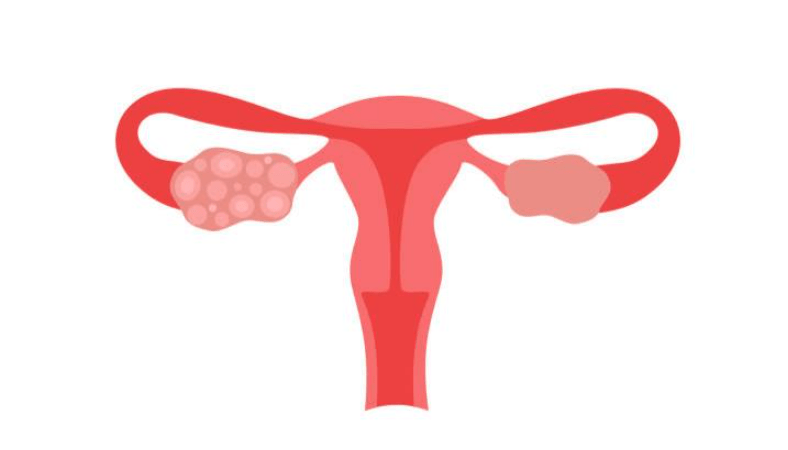Polycystic Ovary Syndrome (PCOS) is a prevalent hormonal disorder that affects women. This condition often leads to excessive hair growth, acne, irregular menstrual cycles, and weight gain, which can be challenging to manage.
Let’s explore how contraceptive implants work to help manage the symptoms of PCOS.
Understanding Polycystic Ovary Syndrome (PCOS)

Polycystic Ovary Syndrome (PCOS) affects individuals assigned to females at birth, particularly during their reproductive years. This hormonal disorder is primarily marked by three main features:
- Irregular Menstrual Cycles: Women with PCOS often experience irregular or absent periods due to anovulation (failure to ovulate). This can manifest as infrequent menstrual cycles or amenorrhea (no periods at all).
- Excess Androgens: Individuals with PCOS typically have elevated levels of androgens (male hormones) that may lead to acne, hirsutism (excessive hair growth on the face, back and chest), and thinning hair on the scalp.
- Ovarian Cysts: Many women with PCOS develop small fluid-filled sacs (follicles) in their ovaries. However, it’s important to note that not all individuals with PCOS will have visible cysts on ultrasound.
Long-Term Health Risks Associated with PCOS
Type 2 Diabetes
Women with PCOS are at risk of developing insulin resistance, leading to type 2 diabetes. 40% of women with PCOS may exhibit some level of abnormal glucose tolerance, including diabetes or prediabetes. Insulin resistance is often linked to elevated insulin levels, which can exacerbate symptoms of PCOS and contribute to metabolic complications.
Cardiovascular Issues
PCOS is associated with hypertension (high blood pressure) and dyslipidemia (abnormal lipid levels). Women with PCOS may have a higher prevalence of these risk factors, which can increase the likelihood of developing heart disease over time.
Endometrial Cancer
Irregular menstrual cycles in women with PCOS can lead to a thickened uterine lining (endometrium). When menstrual cycles are infrequent or absent, the endometrial lining may not shed properly, increasing the risk of hyperplasia (thickening) and, subsequently, endometrial cancer.
What Are Contraceptive Implants?

Contraceptive implants are small, flexible rods inserted under the upper arm’s skin. They can remain effective for up to three years, offering a long-term contraceptive solution that is both convenient and discreet.
How Do Contraceptive Implants Work?
The contraceptive implant functions by releasing small amounts of progestin into the bloodstream. This hormone has several effects:
- Inhibits Ovulation: Prevents the ovaries from releasing eggs.
- Thin Uterine Lining: This makes it less likely for a fertilised egg to implant.
- Thickens Cervical Mucus: Creates a barrier to sperm, reducing the chances of fertilisation.
For women with PCOS, this hormonal regulation can help address irregular periods and reduce symptoms associated with hormonal fluctuations.
Benefits of Contraceptive Implants for Managing PCOS Symptoms
Contraceptive implants may potentially help manage PCOS symptoms through:
- Regulation of Menstrual Cycles: One of the most significant benefits of contraceptive implants is their ability to help regulate menstrual cycles. Many women with PCOS experience irregular or absent periods due to hormonal imbalances. By providing a consistent level of hormones, implants can lead to more regular menstrual cycles.
- Reduction of Hyperandrogenism Symptoms: Women with PCOS often experience symptoms related to high levels of male hormones (androgens), such as hirsutism (excessive hair growth) and acne.
Although contraceptive implants primarily contain progestin, they may help reduce these symptoms by stabilising hormone levels. - Convenience and Long-Term Use: Contraceptive implants offer a long-term solution for birth control, lasting up to three years, with minimal maintenance required. This convenience can be particularly beneficial for women who find it hard to adhere to daily medication regimens.
Considerations and Side Effects
While contraceptive implants can provide relief from some PCOS symptoms, they are not without potential side effects. Common side effects include:
- Irregular bleeding or spotting
- Weight gain
- Mood changes
- Headaches
A healthcare provider will discuss these potential effects with a healthcare provider to determine if this method is suitable for you.
Who Should Consider Contraceptive Implants?
Contraceptive implants may be an excellent option for women diagnosed with PCOS who are looking for an effective way to manage their symptoms without daily medication. However, they may not be suitable for everyone, especially those with a history of breast cancer or blood clots. Consider consulting a healthcare provider before considering this method.
Consultation and Assessment
Before deciding on contraceptive implants as a treatment option for managing PCOS symptoms, it is crucial to undergo a thorough medical assessment. This assessment typically includes:
- A review of medical history
- Discussion of current symptoms
- Evaluation of any underlying health issues
This process ensures that the chosen contraceptive method aligns with your health needs and lifestyle.
Conclusion
Contraceptive implants can potentially manage PCOS symptoms through hormonal regulation. They offer several benefits, including menstrual cycle regulation and reduced androgen levels, which can alleviate some common symptoms associated with this condition. However, as with any medical intervention, consult a healthcare professional to assess individual suitability and discuss potential risks.
Hey welcome to my blog . I am a modern women who love to share any tips on lifestyle, health, travel. Hope you join me in this journey!

Speak Your Mind